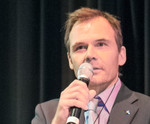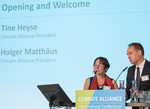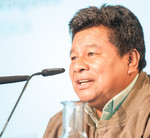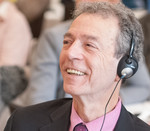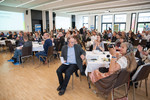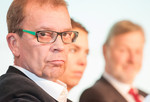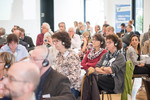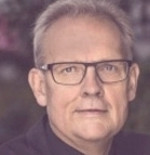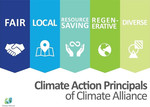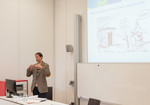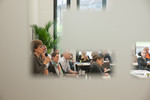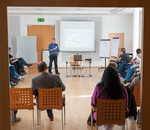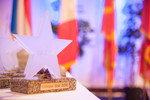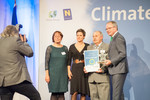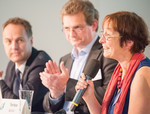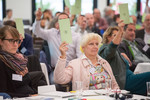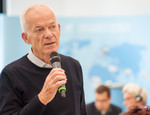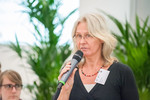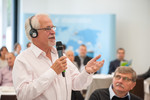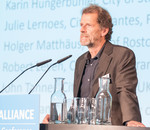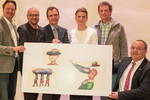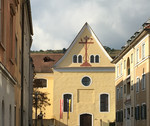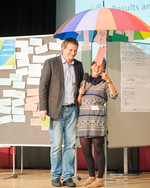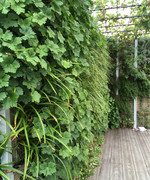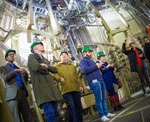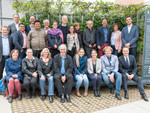 |
eClimail |
|
|
Contents |
Conference and Climate Star Gala
This year, the International Climate Alliance Conference took place in the Lower Austrian city of Krems an der Donau. The occasion was also marked by the festive Climate Star Gala held in Grafenegg Castle: it was the first time Climate Star were awarded within the framework programme of the Annual Conference. A total of 270 representatives from municipalities, districts, countries and civil organisations coming from a total of 10 countries discussed “a culture of local climate action” from 5 to 8 October 2016 in Krems. Here you will find photos and presentations from the Conference as well as pictures from the Gala and press photos from the Climate Star Award Ceremony: www.climatealliance.org/events Welcome
During his welcoming address, Peter Obricht, Head of Department of Environment and Energy Economics of Lower Austria, emphasised how climate action should influence people’s lifestyles. He underlined the importance of local projects, both for visibility and to encourage participation, as these show how everyone can get involved. He also highlighted the significance of cooperation with partners of the Global South, for example, in the Amazon region. Climate Alliance presidents Tine Heyse, Councillor for Environment, Climate, Energy and North-South of the City of Ghent, and Holger Matthäus, Senator for Buildings and Environment of the City of Rostock, reaffirmed the importance of the local level for climate policy. Heyse described how the Paris Agreement shows that cities do not stand alone when it comes to climate action. Matthäus thanked the organisers - the Federal State of Lower Austria and Climate Alliance Lower Austria - for the realisation of the seventh Climate Star award ceremony as well as the Dutch Klimaatverbond for its return to the European-wide Climate Alliance network. “Despite progress, more and more CO2 is being blown into the air,” he lamented. Even so, the Paris Agreement stands as a giant step in the right direction. Edwin Vásquez, Coordinator of COICA, presented COICA’s actions in fighting climate change. In 2011 the first Indigenous Climate Summit took place in Manaus. At the next meeting it was decided that megaprojects should not infiltrate the rainforest. The third summit took place in 2016 in Lima as preparation for the COP22. Vásquez called on conference participants to actively protect the climate and the forest, especially as the warming of our climate is already becoming more intense. “Our shamans say, it is already five minutes past midnight.” Markus Hafner-Auinger, Director of Climate Alliance Austria, and Thomas Brose, Director of the European Secretariat of Climate Alliance, expressed further thanks to the organisers - especially to Petra Schön of Climate Alliance Lower Austria. The Annual Conference was expertly moderated by Ines Omann and Karin Küblböck. Many thanks to them, to all involved and to the Federal State of Lower Austria and the City of Krems an der Donau.
Collective action towards just and sustainable futures
Under the headline “Collective action towards just and sustainable futures” Ilan Chabay, Senior Fellow at the Institute for Advanced Sustainability Studies in Potsdam, placed the question of addressing change at the centre of his lecture. He explained how we have lost communities to the sea and that the warming and the weather changes threatened unexpected consequences, such as ice melting and jet streams – for inhabitants of the Acrtic and Amazon alike. We will, however, not get further with more theory alone. The data has not told us anything; instead, we tell each other what the data means. Explanations of the complexity of climate change and the logic of the consequences are at odds with good communication, true understanding and, most importantly, emotions. If we want to take people with us, we have to reach them on an emotional level. Making it happen - Local good practice examples
As the first of three reactions by local actors, Wolfgang Frank, Pastor of Dechantskirchen, Austria, explained that we are living at the expense of the next generation and at the expense of the Global South. Affirming that the emotional level is critical to lasting change, he noted that one person, be it the town pastor or the mayor, must be passionate about fighting climate change. Valentí Junyent Torras, Climate Alliance Board Member and Mayor of the Municipality of Manresa in Catalonia, presented the area’s programme for forest management and biomass production covering 311 municipalities of the Province of Barcelona. He called for the launch of a culture of climate action. Ronald van Meygaarden, Deputy Mayor of the Dutch Municipality of Geldermalsen, explained the emotional aspects of acceptance by means of wind power, emphasising that emotions always play a critical role.
Looking back and forth: Paris and Marrakesh
Emotions also played an important role in the success of the Paris Agreement. This session looked back on the Climate Summit of Paris and forward towards CPO22 in Marrakech. Joost Venken, City Councillor of Hasselt, described his enthusiasm about his role as Climate Alliance Ambassador at the COP21 in Paris, noting how the presence of so many people pursuing same goal motivated one another. As ambassador, he first had to approach others to start a dialogue but was later approached by many. Julie Laernoes, Climate Alliance Board Member and Vice-President of the Metropolitan Region of Nantes, stressed how positive emotions should replace negative ones in the fight for climate action. She described her also hopes for more cooperation - not just between local authorities, but also with NGOs. Secretary of State for Sustainable Development and Infrastructure in Luxembourg, Camille Gira, also highlighted the importance of numbers. The municipalities must quantify what they are doing. He explained the Paris Agreement’s implementation, which is first taking place from the European level and then trickling down to the national and the local levels. Helmut Hojesky of the Federal Ministry of Agriculture and Forestry, Environment and Water Management in Austria stressed the significance of both climate protection and adaptation to climate change. For his ministry, communication with Austrian mayors via good practice examples is key. After a podium discussion between all participants on the implementation of the Paris Agreement, session moderator Pirita Lindholm of the Climate Alliance Brussels Office presented the Climate Alliance Ambassadors for the present climate summit. Steen Christiansen, Mayor of Albertslund, and Andreas Wolter, Mayor of Cologne, presented Climate Alliance in Marrakesh.
Not all climate action is created equal - how municipal goals compare
This workshop focussed on various climate protection targets from “less than 2° warming” goal of the Paris agreement, the 2000 Watt society and the Climate Alliance target of reducing CO2 emissions by 10 percent every 5 years all the way to resource consumption goals. These were discussed against the background of the Climate Alliance’s five Climate Action Principles, which were presented the day before: resource-saving, fair, regenerative, local and diverse. Key questions included the compatibility of these guiding principles with various climate protection targets as well as concrete ways in which these principles can help municipalities with strategic climate action decisions. Cooperating on climate action within municipalities and beyond
This workshop offered participants the opportunity to exchange with colleagues on success factors and barriers to improving different forms of cooperation in the field of climate action. Hannah-Sophie Stabel, climate manager in Kaiserslautern, and Joost Venken, Deputy Mayor of Hasselt, showed how they restructured processes in their administrations within the framework of the Covenant of Mayors so as to better and more effectively involve local actors. In addition, Karl Kofler, climate manager of the three Austrian municipalities of Arnoldstein, Finkenstein am Faaker See and St. Jakob, spoke of his experiences with small local authorities. The power of participatory financing solutions
Local authorities are increasingly experimenting with alternative financing schemes to mobilise private investments for their ambitious climate and energy projects. Konstanze Stein from the Klimaschutz- und Energieagentur Baden-Württemberg explained the training of municipalities in the Energy Performance Contracting model, which they are even using for deep energy retrofits. Nuno Brito Jorge, Coordinator of Citizenergy, introduced two examples, a crowdfunding effort in Great Britain and an energy cooperative in Portugal, showing how municipalities can use alternative financing models to fund sustainable energy projects. Finally, Eftima Petkova of the Bulgarian City of Smolyan illustrated how her municipality is collaborating with six other local authorities in the Rhodope Region to launch a one-stop-shop model via the CITYnvest project. App.lying Sustainability - Online tools for participative urban planning
This workshop dealt with the special features of online tools in municipal climate protection as well as the challenges surrounding their use. GreenApes, a social network that rewards sustainable ideas and activities, was presented by managing director Gregory Eve. Via video, Katherina Borsi of the University of Nottingham introduced Geo-Timeline, a tool used to share personal sustainable places. Geo-Timeline was developed within the framework of the TURAS research project, of which Climate Alliance is a partner. Finally, Jörn Klein introduced Climate Alliance’s RADar tool for cycling infrastructure. The participants discussed data protection, cooperation with external IT service providers as well as the coordination and choice of suitable tools. The group proposed potential the creation of a Climate Alliance working group in order to continue this exchange on the target-oriented application of online tools. A culture of (ex)change and climate justice
Thomas Brose, Executive Director of Climate Alliance, kicked off this workshop with a short input on the importance of global cooperation and its roots in the network. Maximilano Menezes of the Coordination of the Indigenous Organisations of the Brazilian Amazon (COIAB) and the Federation of Indigenous Peoples from the Rio Negro (FOIRN) then spoke about his experience with global partnerships. One prominent example is the long-term cooperation between the FOIRN and Climate Alliance Austria. Bernadette-Jutta Felsch of Munich presented the Munich’s direct partnership with the Asháninka people of Peru, which was started in 1997 as a results of Munich’s Climate Alliance membership. Municipalities and adaptation to climate change - from risk to opportunity
Thomas Bausch of the University of Applied Sciences in Munich gave the participants of this workshop an insight into a climate adaptation research project being carried out in Bavarian local authorities. Concrete examples shown included climate-adjusted land use planning in the Municipality of Schwindegg and winter tourism in the Municipality of Mittenwald. With this lecture, Wolfgang Lexer from the Austrian Environment Agency identified climate change adaptation as a field of action for cities and municipalities. Daniel Buschmann from the University of Natural Resources and Life Sciences in Vienna provided an insight into the state of research at the local level. He drew the curve from theory to practice and provided initial insights into the success factors and barriers of adaptation to climate change.
Gala and award ceremony at Grafenegg Castle
Some 15 local authorities and municipal associations from 7 European countries were awarded with a Climate Star 2016 for their commitment to climate action during a festive awards gala held in Grafenegg Castle. Municipal winners with up to 10,000 inhabitants were Alsómocsolád of Hungary, Krumbach, Krumpendorf and Ober-Grafendorf of Austria as well as Sarentino of Italy. In the category of municipalities with up to 100,000 inhabitants, Esch-sur-Alzette of Luxembourg, Filderstadt of Germany, Götzis of Austria, Karpoš of Macedonia and Pesaro of Italy took home Climate Stars while Basel of Switzerland claimed the prize in the category of local authorities with up to 100,000 inhabitants. The following municipal associations where also honoured: the Korneuburg District in Austria, the Gossau - St.Gallen - Gaiserwald Energy Network in Switzerland, the ALTBAUNEU Network in Germany and the Thayaland Region in Austria. Information on the projects: www.climate-star.net
2015 Annual Report
The 2015 Annual Report (pdf, 22.400 KB), presented at the General Assembly, contains a large number of projects carried out at the European Secretariat throughout 2015 and beyond. Topics include climate justice, the Covenant of Mayors and other European initiatives, resource efficiency, climate action and renewable energies, Climate Alliance campaigns, coaching and networks, resilience and adaptation to climate change as well as financing climate action. Last year the Climate Alliance Working Group on Adaptation to climate change was also set up in addition to the already existing Working Group on Financing. Currently, Climate Alliance has more than 1,700 members spread over 26 European countries, with membership increasing slightly over 2014. For currently numbers, please see the Climate Alliance website. Board elections
The General Assembly re-elected four members of the Executive Board for two further years: Tine Heyse, Councillor for Environment, Climate, Energy and North-South of the City of Ghent (BE), Karin Hungerbühler, Deputy Department Head of Communications, Sustainable Development, Mobility and Environment of the City of St. Gallen (CH), Julie Lernoes, Vice President of Nantes Métropole (FR) and Holger Matthäus, Senator for Buildings and Environment of the City of Rostock (DE). Three new Board Members were elected: Robert Leven, 3rd Juryman of the City of Hesperange (LU), Ronald van Meygaarden, Deputy Mayor of the City of Geldermalsen (NL), and John Tanner, Councillor of the City of Oxford. Congratulations! In addition, Valenti Junyent Torras, Deputy President of Natural Spaces and Environment at Barcelona Provincial Council and Mayor of the City of Manresa (ES), replaced former Board Member Joan Puigdoller while Eider José Perasan Ramirez, Coordinator for Environment, Climate Change and Biodiversity of the COICA in Quito (EC), replaced former Vice President Jorge Furagaro. We would like to thank the former members of the Executive Board for their work and dedication in recent years! Board members Giulio Guerzoni, Councillor for Sport, Youth, Environment, Energy Policy and Civil Services, Civil Protection and Volunteering of the City of Modena (IT), Rainer Handlfinger, Mayor of the Municipality of Ober-Grafendorf (AT), Simone Raskob, Councillor and Head of the Department for Building and Environment of the City of Essen (DE) und Eva Schobesberger, City Councillor of the City of Linz (AT), were elected in 2015 and will remain in office. The Executive Board members at a glance.
Get-together and opening of the exhibition “Facing the Climate”
On the eve of the conference, participants were greeted in Krems with a get together in the Monastery UND. Albert Kisling, City Councillor of Krems an der Donau, Peter Olbricht of the Federal State of Lower Austria and Rainer Handlfinger, Board Member of Climate Alliance and Mayor of Ober-Grafendorf all spoke words of welcome. Helen Eduards, Ambassador of Sweden in Austria, opened the Facing the Climate caricature exhibition on climate change. In this exhibition, Swedish and Austrian artists approached the serious topic of climate change with funny and sometimes irritating pictures. The pleasant atmosphere of the evening stimulated conversation and ensure a successful start to the conference. Marketplace - Members present their solutions
On the second conference day, 14 Climate Alliance members, including the host city Krems and the host region, the Federal State of Lower Austria, presented their activities and projects with market stands. A wide variety of topics were covered with good examples coming from local authorities from Germany, Austria, Switzerland and Finnland as well as Climate Alliance Italy. Working Group on Adaptation
The Climate Alliance Working Group on Adaptation took advantage of the conference in Krems to discuss the European adaptation strategies to climate change. Giuliana Torta of the European Commission and Sirpa Hertell, City Councillor of the Finnish City of Espoo, explained the review plans submitted by the Commission on the adaptation strategy. Torta stressed the involvement of cities and municipalities and in particular of networks such as Climate Alliance in the process. Participants called for stronger European support to raise awareness of measures to be taken with local authorities, local politicians and the public as important target groups. As concrete examples of adaptation strategies on the ground, Rainer Kapp of the City of Stuttgart presented his experiences with heat islands and Mayor Hans-Joachim Kosubek reported on the City of Worms’ adaptation new strategy, explaining how local politicians can best be involved. Mobile Green Living Room
The “Mobile Green Living Room” was also shown prominently on the grounds of the IMC University of Applied Sciences Krems for the duration of the conference. This green room, built on a small truck and consisting of a small vertical garden with benches, made its stop in Krems during a tour through Europe. It was developed via the EU research project by the name of TURAS and demonstrates, among other benefits, how the immediate environment can be pleasantly and sustainably cooled on hot days through the evaporation of water from plants. As a climate change adaptation measure, the Green Living Room concept can foster the greening of public spaces, courtyards, facades and roofs. Excursions: Zwentendorf, Ober-Grafendorf, Passive Houses
At the close of the conference, participants had the choice between three excursions. They could visit the only nuclear plant in Austria in Zwentendorf, which had never been on stream. A tour through the Lower Austrian municipality of Ober-Grafendorf showed how local climate protection is practiced in a small local authority, and finally, a tour to two large passive house buildings in Krems showed how energy efficiency building can be. Next Climate Alliance Conference
Next year’s International Climate Alliance Conference is set to be held in Essen, the European Green Capital 2017 in the center of the Ruhr area - expected during the week from 18 to 22 September 2017. Stay tuned for exact dates and further details! We look forward to seeing you there! |
Contact information |
|
Newsletter You receive this e-mail because you are registered in our mailing list. If you would like to be removed from the list please send an e-mail to europe@climatealliance.org.
Contact Angela Hanisch Imprint
Registered Association: |


